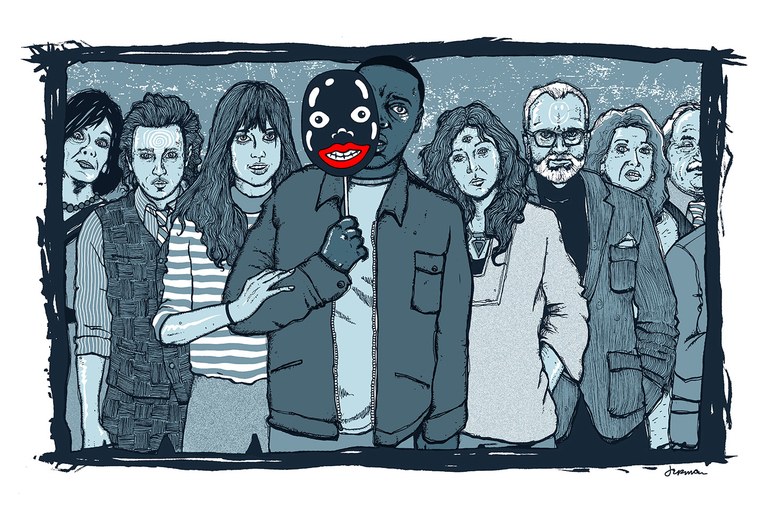Chris: “Why black people?”
Jim Hudson: “Who knows? Some people want to change– some people want to be stronger, faster, cooler. But don’t, please, don’t lump me into that. I couldn’t give a shit what color you are: what I want is deeper. I want your eyes, man. I want those things you see through.”
Stronger: Since even before America’s founding, African slaves have been the slave of choice due to their ability to complete back-breaking labor without succumbing to sickness or death. They are perceived as physically superior since they were forced to endure the hardest labor known to man and unending torture.
Faster: In a study conducted by Waytz, Hoffman, and Trawalter for Social Psychological and Personality Science, it was found that black people were chosen as more likely to possess superhuman abilities 65 percent of the time, but for everyday abilities, they were chosen only 46 percent of the time over white people. The study concludes that this theory of superhumanization stems from the perception that black people are physically superior while white people are mentally and emotionally superior. Waytz concludes, “Ultimately we believe that superhumanization is just another way of ‘othering’ African Americans.” Superhumanization, in the end, is just dehumanization in a cape.
Cooler: This obsession with black culture can be traced back to the introduction of black slaves into Southern homes. Before the cotton gin, slaves and masters worked in close quarters wherein slave owners took great interest in their slaves– watching the slaves play and even adopting facets of their language. Today, we see this appropriation of culture in a more blatant light. Kylie Jenner, a white reality TV star, dons dreads and Fashion Police praises her “edginess” but when Zendaya Coleman, a black actress, sports dreads, they must “smell like weed.” When Iggy Azalea highlights her big butt or Kylie Jenner’s big lip pout goes viral, Viola Davis is pegged as “less classically beautiful”. It has become cool to take on their culture without taking on the vessel with which they experience the world.
Your Eye: Jim Hudson explains that his desire to inhabit Chris’ body is more genuine than the others’– he is going to steal Chris’ agency in order to gain Chris’ perspective. This draws many parallels to the effects of being “colorblind” in the “post-racial” present. Jim Hudson excludes himself from racist people by noting the lack of importance he sets on “color” much like those that claim “colorblindness” champion their ignorance of the inherent variations in experience based on race. Jim Hudson condemns Chris to a place of paralysis by stealing Chris’ perspective as his own. This mirrors the way that dismissing the differences of minorities under inherently racist social and political structures doesn’t miraculously lift minorities to equality but rather buries and devalues their voices when they protest injustice. Like Jim Hudson robs Chris of his literal ability to control his body, those that claim they’re “colorblind” rob Black America of the credibility assigned to their stories of oppression and injustice.
Connections to the Readings
Da Silva sets the foundation for each of the following arguments by identifying Western imperialist ideals of a hierarchy of rationality based on the degree of variation from the phenotypical universal as the basis of most social and political structures today. Hancock builds on this by noting the distinct profit made from exploiting black stereotypes in the entertainment industry and its negative effects on the stereotyped group– just as the Armitage’s seek to make a profit by selling black bodies for their stereotypically beneficial attributes. Harris and Agostinho emphasize the way feminism and intersectionality are watered down to be more palatable to the general audience when utilized as a profit producing tool in mainstream media– speaking to the cool factor that the media exploits without addressing the systemic oppression of marginalized individuals. Lastly, Jackson identifies “colorblindness” as a term created by the privileged to erase uniqueness and refrain from addressing slavery, colonialism, and imperialism. In short, this scene of Get Out portrays the way society seeks to adopt and profit from black culture without addressing or attempting to ameliorate the oppressive natures that keep those that form the root of the culture from succeeding.
Connections to Current Events
Rachel Dolezal, the former president of the National Association for the Advancement of Colored People, pretended to be of African American descent for several years. She has tried to integrate herself into black culture and has made multiple allegations of discrimination and hate crimes against her because of her white descent. While a student at Howard University, a historically black university, she began darkening her skin and changing her hair texture to appear “blacker.”
The Armitage family in the film also have an obsession with blackness and with being black. Both acknowledge racism but have switched it so that it is black people getting advantages that should, in some way, be theirs. In Dolezal’s case, she changes her appearance to fit in with a community that she wants to fit into. She does not appreciate the cultural appropriation that she is participating in, instead of viewing it as a “social construct” that she is able to manipulate as she likes. In the Armitages’ case, they undergo surgery in order to appropriate a body that they see as physically stronger, better, but also theirs to take. Neither sees black bodies or black culture as something that is not theirs to take at will, and neither appreciates the racism that black people face on a daily basis. In Get Out, several white people asked Chris if he liked the “African American experience.” It was not an opening to discuss the challenges he faces as a black person in a white-dominated society, but rather an expectation of their feelings—those that suggest that black people are facing fewer challenges than white people—being confirmed. They expected Chris to tell them that it was better being black. Both they and Rachel Dolezal fetishize the black body and the black culture.
